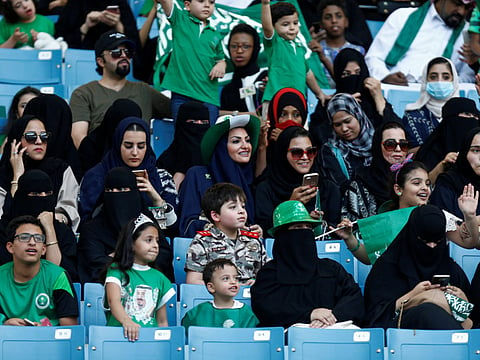Saudi Arabia on the fast-track to reform
Changes brought about by Mohammad Bin Salman have ushered in era of openness in country

Religious scholars have been fairly quiet in recent times in Saudi Arabia, or so it seems. With radical changes being implemented by King Salman Bin Abdul Aziz and Crown Prince Mohammad Bin Salman with regard to domestic issues, it is a wonder that there has been little in the way of comments or objections emanating from a body that was once so powerful that it literally throttled any form of progress in the country.
All the recent changes one observes today were intentionally denied in the past due to the pressure from the religious fundamentalists who perceived anything new or alien as haram or a sin.
They are the ones who fought long and hard against satellite dishes, the argument being that the airwaves would be full of corrupting influences on our ‘special’ society and transform our citizenry into a lecherous lot.
They denounced the introduction of cameras in mobile phones, again objecting on the grounds that these phones would threaten the moral fibre of the country by making contact between men and women much easier.
Their objections were so loud that traders in these phones were initially afraid to openly display them for fear of reprisals. These clerics rose en masse against the thought of integrating Saudi women into the workforce, insinuating that the women had no place outside their homes.
But as economics began to tug at such values and the women had to go out and work to meet the rising expenses, the clerics insisted on total segregation between the sexes.
In fact, mixing of genders was one shade less than a punishable crime and was strictly enforced by the religious police, also known as the Hai’a.
They fought long and hard against allowing women the liberty to drive themselves, with some stating that biological alterations would take place within a woman’s reproductive system, while others lamented that such a move would encourage women to leave their homes and carry out nefarious activities.
There were no such things as cinemas or entertainment shows in the country, no public event for singers or drama acts and even the book fairs drew considerable criticism from the religious establishment.
Such actions and more were strongly enforced by the religious establishment that wielded tremendous power and had come to be seen as the shadow government. With their troops out on the streets, policing public behaviour, and their Friday sermons defining what was right and wrong through their intolerant interpretation of Islam, they had indeed stifled Saudi society.
Return to moderate Islam
But then, the clouds subsided and sunshine began to creep through. In late 2017, not long after he had assumed his role as Crown Prince, Mohammad Bin Salman declared war on the clerical elite that had long directed Saudi society according to their rigid beliefs.
Set to be the next Saudi king, Prince Mohammad emphatically stated: “We are returning to what we were before, a country of moderate Islam that is open to all religions and to the world. We will not waste 30 years of our lives dealing with extremist ideas. We will destroy them today.”
We are returning to what we were before, a country of moderate Islam that is open to all religions and to the world. We will not waste 30 years of our lives dealing with extremist ideas. We will destroy them today.Prince Mohammad Bin Salman
Islam: The religion of tolerance, moderation
He later added that Saudi Arabia “will remain committed to the principles” of Islam, “the religion of tolerance and moderation”.
The Kingdom “will keep on fighting against extremism and terrorism” — a message directly meant to counter the outrageous edicts released by the leading clerics against anything they perceived as a threat to Saudi society
The crown prince introduced quick changes. According to his Vision 2030 plan, Prince Mohammad wants women to be a part of the workforce in larger numbers, they are now allowed to drive and cinemas are now welcome in the kingdom.
In fact, a government body was established to promote entertainment on an international level and has resulted in diverse fares such as the WWF Championships and Mariah Carey’s concert. All this to an appreciative Saudi public, long starved of meaningful entertainment and amusement activities.
The clerics were suddenly silenced and their policing powers stripped. They were not in charge anymore.Instead, the government took the reins to guide Saudi society.
But not all went smoothly. Only recently, one leading cleric made himself heard and in the process defined all that was previously outrageous. Shaikh Abdullah Al Manea, a member of the Saudi Council of Senior Scholars, went on air, according to local reports, to decry the use of coloured contact lenses for women.
He said that Muslim women should not wear them for beauty or adornment, adding that wearing lenses for non-medical reasons amounted to tampering with God’s creation. He concluded that Muslim women who wore them imitated non-Muslim women and also claimed that these lenses caused eye diseases.
In today’s climate, I am afraid the Shaikh will not have too many people nodding their heads to this latest fatwa.
Tariq A. Al Maeena is a Saudi socio-political commentator. He lives in Jeddah, Saudi Arabia. Twitter: @talmaeena.






